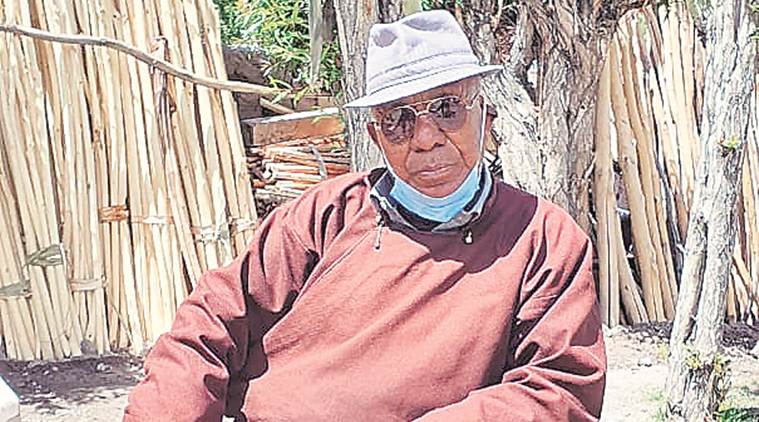 Phunchok Tashi. (Express Photo)
Phunchok Tashi. (Express Photo)
The Galwan Valley in Ladakh, where Indian and Chinese troops clashed on June 15, once echoed with songs by Lata Mangeshkar and Mohammed Rafi.
Phunchok Tashi, a veteran of the 1962 Indo-China war, recalls a time when the Chinese Army used loudspeakers to play Hindi songs in an attempt to befriend the Indian soldiers and get them to leave their posts.
Now 84-years-old and living in Stok village, around 17 km from Leh city, Tashi told The Indian Express that two of the songs the Chinese used to play were Mangeshkar’s Man Dole Mera Tan Dole from the 1954 movie Nagin, and Rafi’s Tumsa Nahi Dekha from the 1957 movie of the same name.
“I was in Daulat Beg Oldi (in Ladakh) as part of 14 J&K Militia Company (which would later form the Ladakh Scouts). We got orders to reach Galwan Valley. At that time, our post was called ‘nayi post’ (new post)… In those days, it was considered a drop zone and aircrafts used to drop ration supplies. We used to patrol using horses and yaks. I remember that Chinese were on top of the hill on the other side, while were in the plains,” he said.
Tashi said the two sides faced off for several days. “They kept sitting on top of the hill on their side and we on the ground on our side. They had put up huge loud speakers and used to make announcements in Hindi – Yeh jagah na aapka hai, na hamaara hai, aap bhi vaapis jao, hum bhi vaapis ja rahe hain (This land neither belongs to you, nor us. You also go back, we are also going back). Then, after their lunch time, they used to play songs… For days, they kept on doing the same thing and playing these songs,” Tashi said.
He said the purpose of playing the songs was “an attempt by the Chinese to befriend us and convince us to head back”.
Tashi, who retired as Honorary Captain in 1988, said the Chinese activity along the Line of Actual Control was a common occurrence even in 1962. “There was never a dispute since they were on their side on top of the hill and we were on our side of the river in the plains… I do not know the exact reason what transpired the ongoing tension, but it must be because India has now created ample road infrastructure on our side of the LAC, which might have troubled the Chinese,” he said.